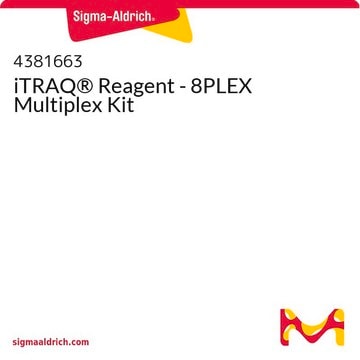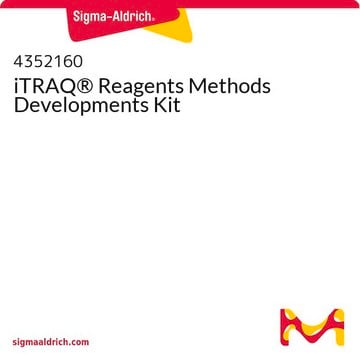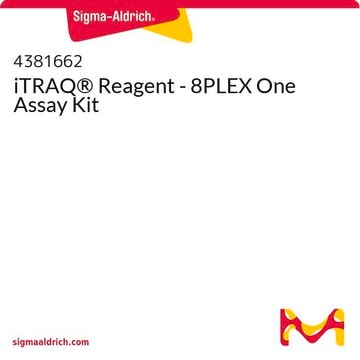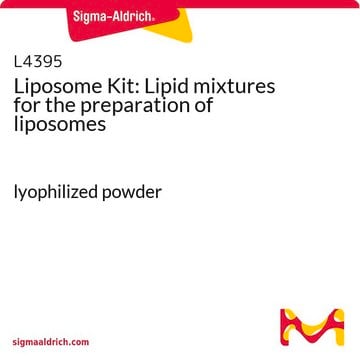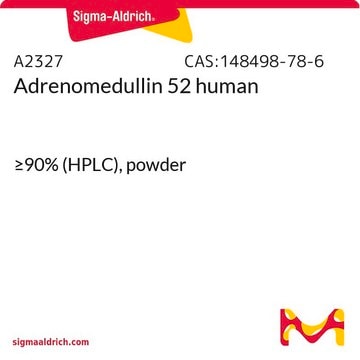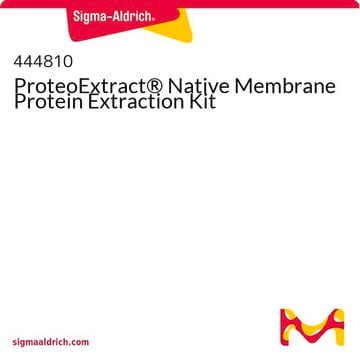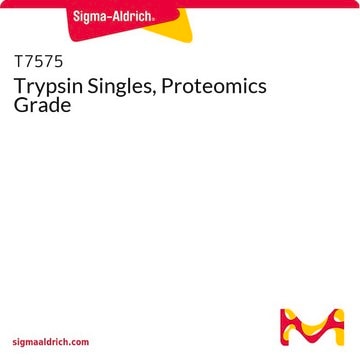4352135
iTRAQ® Reagents Multiplex Kit
Sinónimos:
isobaric tags for relative and absolute quantitation
Iniciar sesiónpara Ver la Fijación de precios por contrato y de la organización
About This Item
UNSPSC Code:
12161503
NACRES:
NA.24
Productos recomendados
General description
Contains iTRAQ® reagents 114, 115, 116, 117, the appropriate buffers and reagents for ten 2-plex, six 3-plex, or five 4-plex assays. 10-PK trypsin is sold separately. Each individual reagent is capable of labeling up to 100 μg of protein.
Application
The iTRAQ® Reagents Multiplex Kit provides iTRAQ® reagents and protocol to label peptides after digestion. This widely used generic labeling kit can be used for virtually any workflow.
iTRAQ® Reagents Multiplex Kit has been used for the labeling of peptides for LC-MS (liquid chromatography–mass spectrometry)/MS analysis.
iTRAQ® Reagents Multiplex Kit has been used for the labeling of peptides for LC-MS (liquid chromatography–mass spectrometry)/MS analysis.
Analysis Note
To view the general Protocol for iTRAQ Reagents, please visit this Protocol link.
To view the Chemistry Quick Reference Card for the iTRAQ Reagents, please visit this Chemistry Quick Reference Card link.
The Certificate of Analysis (CofA) for your specific lot is accessible by entering the product number and lot number at this CofA access link.
To view the Chemistry Quick Reference Card for the iTRAQ Reagents, please visit this Chemistry Quick Reference Card link.
The Certificate of Analysis (CofA) for your specific lot is accessible by entering the product number and lot number at this CofA access link.
Legal Information
iTraq is a registered trademark of AB Sciex Pte. Ltd.
signalword
Danger
Hazard Classifications
Acute Tox. 4 Dermal - Acute Tox. 4 Inhalation - Acute Tox. 4 Oral - Eye Irrit. 2 - Flam. Liq. 2 - Skin Irrit. 2 - STOT SE 3
target_organs
Central nervous system
Storage Class
3 - Flammable liquids
flash_point_f
35.6 °F - closed cup
flash_point_c
2.0 °C - closed cup
Elija entre una de las versiones más recientes:
¿Ya tiene este producto?
Encuentre la documentación para los productos que ha comprado recientemente en la Biblioteca de documentos.
Los clientes también vieron
Debra Rossouw et al.
Applied and environmental microbiology, 76(12), 3911-3923 (2010-04-27)
The geno- and phenotypic diversity of commercial Saccharomyces cerevisiae wine yeast strains provides an opportunity to apply the system-wide approaches that are reasonably well established for laboratory strains to generate insight into the functioning of complex cellular networks in industrial
Xiuyan Huang et al.
Journal of proteome research, 9(12), 6759-6773 (2010-10-20)
Regulatory T cells (Treg) induce robust neuroprotection in murine models of neuroAIDS, in part, through eliciting anti-inflammatory responses for HIV-1-infected brain mononuclear phagocytes (MP; macrophage and microglia). Herein, using both murine and human primary cell cultures in proteomic and cell
Huiying Guo et al.
Environment international, 145, 106167-106167 (2020-10-10)
The biological toxicity of deltamethrin at molecular level has been investigated, whereas, the proteome responsive mechanisms of cells under deltamethrin stress at the phylogenetic level are not clear. The proteome expression, transformation-related pathway and regulatory network of Bacillus thuringiensis during
Comparative Analysis of Secretome Profiles of Manganese(II)-Oxidizing Ascomycete Fungi.
Zeiner CA, et al.
PLoS ONE, 11, e0157844-e0157844 (2016)
Izhak Michaelevski et al.
Molecular & cellular proteomics : MCP, 9(5), 976-987 (2009-12-04)
Investigations of the molecular mechanisms underlying responses to nerve injury have highlighted the importance of axonal transport systems. To obtain a comprehensive view of the protein ensembles associated with axonal transport in injured axons, we analyzed the protein compositions of
Nuestro equipo de científicos tiene experiencia en todas las áreas de investigación: Ciencias de la vida, Ciencia de los materiales, Síntesis química, Cromatografía, Analítica y muchas otras.
Póngase en contacto con el Servicio técnico